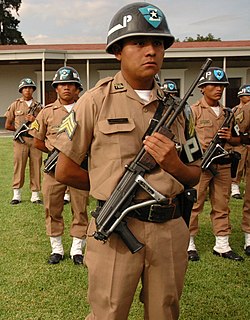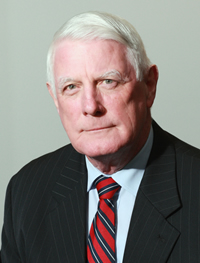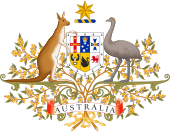
The Australian Defence Force (ADF) is the military organisation responsible for the defence of the Commonwealth of Australia and its national interests. It consists of the Royal Australian Navy (RAN), Australian Army, Royal Australian Air Force (RAAF) and several "tri-service" units. The ADF has a strength of just over 85,000 full-time personnel and active reservists and is supported by the Department of Defence and several other civilian agencies.
Military justice is the legal system that governs the conduct of the active-duty personnel of the armed forces of a country. In some nation-states, civil law and military law are distinct bodies of law, which respectively govern the conduct of civil society and the conduct of the armed forces; each body of law has specific judicial procedures to enforce the law. Among the legal questions unique to a system of military justice are the practical preservation of good order and discipline, command responsibility, the legality of orders, war-time observation of the code of conduct, and matters of legal precedence concerning civil or military jurisdiction over the civil offenses and the criminal offenses committed by active-duty military personnel.

A commander-in-chief or supreme commander is the person who exercises supreme command and control over armed forces or a military branch. As a technical term, it refers to military competencies that reside in a country's executive leadership, a head of state or a head of government.

Military police (MP) are law enforcement agencies connected with, or part of, the military of a state. In wartime operations, the military police may support the main fighting force with force protection, convoy security, screening, rear reconnaissance, logistic traffic management, counterinsurgency, and detainee handling.
An inspector general is an investigative official in a civil or military organization. The plural of the term is "inspectors general".
The King's Regulations and Orders for the Canadian Forces (KR&O) are regulations having the force of law for the governance of the Canadian Forces. They are regarded as the primary document of military law and regulations in Canada – aside from the National Defence Act.
Visiting Forces Act is a title often given to laws governing the status of military personnel while they are visiting within areas under the jurisdiction of another country and/or while forces of one country are attached to or serving with forces of another country.
Section 51(vi) of the Australian Constitution, commonly called the defence power, is a subsection of Section 51 of the Australian Constitution that gives the Commonwealth Parliament the right to legislate with respect to the defence of Australia and the control of the defence forces. The High Court has adopted a different approach to the interpretation of the defence power, which emphasises the purpose of the legislation, primarily the defence of Australia, rather than the subject matter.

The Armed Forces Act 2006 is an Act of the Parliament of the United Kingdom.

Provosts are military police (MP) whose duties are policing solely within the armed forces of a country, as opposed to gendarmerie duties in the civilian population. However, many countries use their gendarmerie for provost duties.

Major General Leonard William Roberts-Smith, is a former Justice of the Supreme Court of Western Australia. From February 2005, he was one of the inaugural Judges of the Court of Appeal Division, having been first appointed to the Supreme Court on 6 November 2000. From May 2007, he served as Commissioner of the Corruption and Crime Commission of Western Australia, having been appointed for a five-year term. He retired on 31 January 2011.
The Australian Army Legal Corps (AALC) consists of Regular and Reserve commissioned officers that provide specific legal advice to commanders and general legal advice to all ranks. They must be admitted to practice as Australian Legal Practitioners.

The Australian Defence Force Investigative Service (ADFIS) was the unified investigative arm of the Australian Defence Force's service police, from 2007 until its amalgamation into the Joint Military Police Force at the beginning of 2020. ADFIS was responsible for complex and major disciplinary and criminal investigations involving the Australian Defence Force (ADF), its assets, land, personnel and capability.

The Royal Australian Corps of Military Police (RACMP) is a corps within the Australian Army. Previously known as the Australian Army Provost Corps, it was formed on 3 April 1916 as the ANZAC Provost Corps. It is responsible for battlefield traffic control, security duties, prisoner of war handling, the investigation of service offences, maintaining discipline and the running of military prisons. Its name was changed in 1918 and it was disbanded in 1920. The corps was reformed during World War II and was granted the "Royal" prefix in 1948, adopting its current name on 4 September 1974. Camilla, Queen consort of Australia became the first Colonel-in-Chief of the Royal Australian Corps of Military Police in November 2012. The Royal Australian Corps of Military Police have played a role in World War I, World War II and aided in conflicts since the finish of the second world war, including Afghanistan and the Timor Leste Crisis. The Corps have embellishments such as the Governor General’s banner which they received in 2001. As well as specific uniform requirements up to and including their standout scarlet beret. The Military Police has a range of training pathways which leads to the many different specialised roles the members hold.

In the United Kingdom, the term military police refers to the three branches of the service police. Often, the term 'military police' is considered synonymous with the Army's Royal Military Police, but in fact, has a wider context. There are a number of civilian police forces whose role is to police other parts of the Defence Estate in the UK and overseas, but such forces are not correctly referred to as military police.
The Australian Military Court (AMC) was a military service tribunal established in 2007 with the primary aim of maintaining military justice within the Australian Defence Force. In August 2009, the High Court of Australia ruled that the AMC was unconstitutional according to the Constitution of Australia, putting the 171 cases the court had tried in doubt. In May 2010, the Australian Government announced a new Military Court of Australia (MCA) to replace the provisional system established after the dissolution of the AMC and to provide an appropriate military judiciary for the Australian Defence Force.

The Catholic Diocese of the Australian Military Services, is a military ordinariate of the Roman Catholic Church immediately subject to the Holy See. It was established in 1969 and maintains its Chancery office in Canberra, ACT. It is a Diocese in its own right and not governed under any Diocese or Archdiosese

Sexual orientation and gender identity in the Australian military are not considered disqualifying matters in the 21st century, with the Australian Defence Force (ADF) allowing LGBT people to serve openly and access the same entitlements as other personnel. The ban on gay and lesbian personnel was lifted by the Keating Government in 1992, with a 2000 study finding no discernible negative impacts on troop morale. In 2009, the First Rudd Government introduced equal entitlements to military retirement pensions and superannuation for the domestic partners of LGBTI personnel. Since 2010, transgender personnel may serve openly and may undergo gender transition with ADF support while continuing their military service. LGBTI personnel are also supported by the charity DEFGLIS, the Defence Force Lesbian Gay Bisexual Transgender and Intersex Information Service.
The Judge Advocate General (JAG) of the Australian Defence Force (ADF) is an office created by the Defence Force Discipline Act (1982), held by a judge or former judge of a federal court or a state supreme court. The appointment of JAG is made by the Governor-General-in-Council. The JAG may make procedural rules for tribunals that operate within the Navy, Army, and Air Force, provide the final legal review of proceedings within the ADF, participate in the appointment of judge advocates, Defence Force magistrates, presidents and members of courts martial, and legal officers for various purposes, and reporting upon the operation of laws relating to the discipline of the ADF.

Until 1689, mutiny was regulated in England by Articles of War instituted by the monarch and effective only in a period of war. This abuse of the crown's prerogative caused Parliament to pass the Petition of Right in 1628. This Act stated that neither civilians nor soldiers and officers who were in England during peace were subject to military courts or law. Only common-law courts and courts of equity could exercise authority over individuals in peacetime England. Because the articles of war did not fall under these court's jurisdiction, military law could not be applied to anyone in England, whether soldier or civilian.











